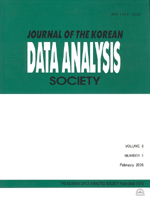Physical Fitness and Brain Electrocortical Activity During Learning Process
- 한국자료분석학회
- Journal of The Korean Data Analysis Society (JKDAS)
- Vol.13 No.4
-
2011.081751 - 1761 (11 pages)
- 3

This study attempted to verify how physical fitness influenced brain electrocortical activity in elementary school students. Students’ five physical abilities were measured including muscular endurance, muscular strength, speed, flexibility, and aerobic endurance ability. Brain waves were measured in two different situations; while brain was at rest and at learning. The relationship between physical fitness and brain waves were analyzed. First, no statistical significance was found in all variables between physical fitness and brain activity while subjects were at rest. Second, while subjects were in learning process, there was a negative correlations statistical significance (p=.017) between SMR waves in the left side of the brain and aerobic endurance ability. There was also a negative correlations statistical significance (p=.007) between beta waves in the left side of the brain and aerobic endurance ability. There was a negative correlations statistical significance (p=.031) between beta waves in the right side of the brain and muscular strength. In conclusion, the “at rest” condition gives no rise of any brain electrocortical activity, despite how high the individual’s physical fitness level is. In addition, students with superior ability in aerobic endurance and muscular strength have comparatively much lower psychological loads and stress.
1. Introduction
2. Subjects and Methods
3. Results
4. Discussion
Reference
(0)
(0)